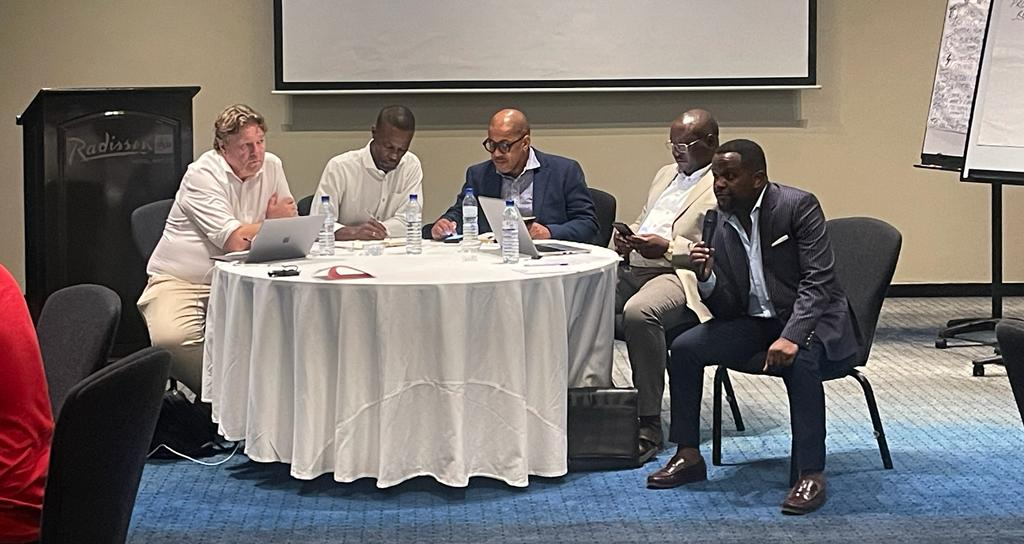Introducing POTENCIAR’s Knowledge Base
To address issues undermining the delivery of basic services in Mozambique, the UK´s Foreign, Commonwealth, and Development Office (FCDO) has funded the POTENCIAR programme since 20201. This development initiative aims to enhance state transparency, make the government more responsive, and promote fair distribution of resources and services by fostering dialogue between citizens, civil society, and government bodies.
The programme takes an innovative research-led and knowledge-centred adaptive approach to achieving inclusive development outcomes. This occurs through a series of Collaborative Initiatives at district and provincial levels with associated national-level evidence synthesis, communication and advocacy strategies.
Central to the programme is POTENCIAR’s Knowledge Base, the first comprehensive open online resource that empowers stakeholders with access to evidence on governance, service delivery, and accountability within the country. The Knowledge Base was recently launched at an event in Maputo, which brought together experts, researchers, NGOs and policymakers. They discussed the importance of analytical work and knowledge sharing in strengthening inclusive service delivery in Mozambique.
This video captures the reflections of Euclides Goncalves and Prof. Eduardo Sitoe on the value of the Knowledge Base for all stakeholders working on governance and social policy issues in Mozambique.
Challenges in access to knowledge and data on governance and social policies
During the event, prominent speakers shed light on the challenges faced by Mozambique in terms of access to knowledge and data on governance and social policies. Euclides Goncalves, co-founder and director of Kaleidoscopio, an independent research think tank, emphasised the need to recognise diverse knowledge sources beyond traditional academia. He acknowledged the invaluable contributions made by NGOs and local partners in generating knowledge on local dynamics. He also highlighted how decentralisation of knowledge production and archiving of existing research are critical to improve their accessibility.
The head of the Political science and Public Administration department at the Universidade Eduardo Mondlane, Prof. Eduardo Sitoe, provided insights into the governance and social policy landscape in Mozambique. He discussed prevalent challenges such as corruption, decentralisation, political participation, health, education, poverty, and inequality. While Mozambique boasts 23 research institutions, many of which are publicly funded, there remains a need for better dissemination of research findings within the country to support local academics and promote scientific independence.

Prof. João Pereira, the executive director of the MASC Foundation and Auxiliar Professor at the Universidade Eduardo Mondlane, stressed how the lack of research infrastructure and resources in Mozambique’s universities hampers the quality of research output. He emphasised the need to empower research institutions and promote collaboration,investing in areas where Mozambique excels to improve the use of research findings in policymaking and advocacy. Furthermore, he highlighted the necessity of creating platforms for information sharing and collaboration among research institutions, NGOs, and policymakers.
POTENCIAR’s Knowledge Base: a resource for communities, practitioners, policymakers and academia
The launch event showcased POTENCIAR’s Knowledge Base, which serves as a valuable resource for all stakeholders working on governance and social policy issues in Mozambique. It contains more than 750 resources, which can be easily accessed through a user-friendly interface. For the first time ever in Mozambique, the platform brings together contributions on governance from diverse stakeholders through various types of documents and multimedia files, such as journal articles, reports, pieces of news, presentations or videos, both in English and Portuguese.
The Knowledge Base follows state-of-the-art approaches to sharing evidence in international development contexts, leveraging the learnings from initiatives such as the EdTech Hub, which curates global evidence regarding the application of technology in education. For more details see also the slide deck that was used in the event, or directly browse the Knowledge Base.
Used internally, this platform has already supported research-led learning and adaptation within the POTENCIAR programme. Now, with its public interface, it can be used by any interested party, not just academic institutions, practitioners, and policy makers, but also local community organisations, such as health co-management committees. Through the platform, the latter can access data and reports about their own communities to improve their accountability efforts. The Knowledge Base can also be used to strengthen advocacy, it can be used in comparative studies, and in utilising local knowledge and experiences alongside relevant international findings. The Knowledge Base is a unique innovative and collaborative solution, the first of its kind in Mozambique, whose ownership will hopefully in the future be transferred to local research institutions.
Contributing to knowledge in an inclusive way
By leveraging and expanding upon the Knowledge Base, stakeholders in Mozambique can make more informed decisions to tackle the complex challenges faced by the country. Its user-friendly interface and navigation allow practitioners, researchers, and academic institutions not only to access valuable resources, but also contribute their own research to the Knowledge Base, and collaborate with others. The comprehensive access to research, data, and evidence offered by this tool, enables stakeholders to address power inequities when publishing their own resources, and ensures that communities and individuals who are researched can benefit from the findings. The Knowledge Base works well in areas with slow connectivity, and can be used to generate bibliographies that can be used offline, so the resources can be consulted in rural communities with poor connectivity.
By providing a decentralised and co-owned repository of resources, POTENCIAR’s Knowledge Base empowers stakeholders to address governance and social policy challenges more effectively. Interested practitioners, researchers, academic institutions, as well as community organisations, are invited to explore its rich repository of resources to support their activities. International development institutions and donors are also invited to engage with the platform to understand how it might benefit their own staff and their partner organisations. This dynamic online platform hopes to serve as a catalyst for collaboration, knowledge sharing, and evidence-based decision-making, ultimately contributing to improved transparency, accountability, and inclusion in Mozambique.
[1. The programme is implemented by Chemonics UK through a consortium with the IDS (Institute of Development Studies), CESC (Centro de Aprendizagem e Capacitação da Sociedade Civil), COWI and FHI-360.]
